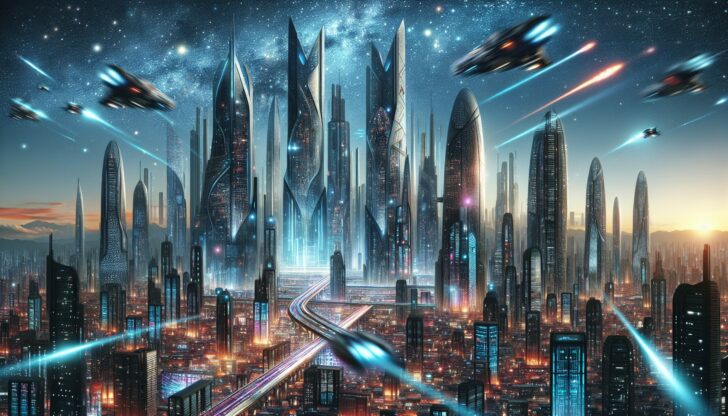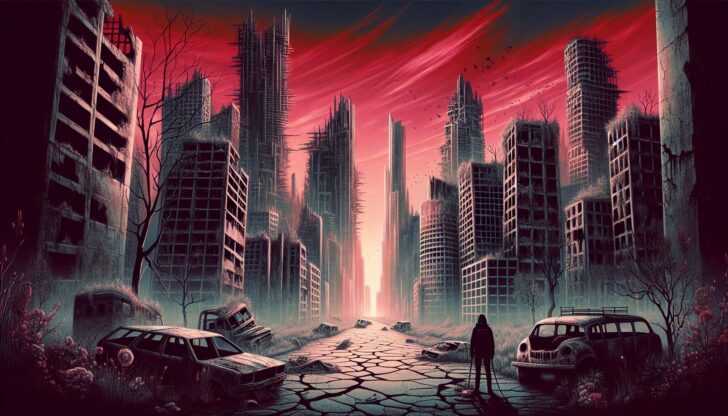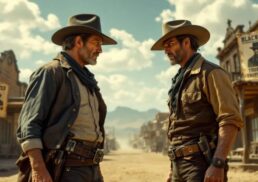Looking for the best book sci fi to transport you to new dimensions? Our expert guide cuts through the nebula of options to bring you the cream of the crop. Immerse yourself in the worlds that set benchmarks for the genre and explore how these narratives transcend mere storytelling to influence both sci-fi and societal perspectives.
Table of Contents
Key Takeaways
The article provides an expansive guide on seminal and influential science fiction books and authors, covering classics like Isaac Asimov’s ‘Foundation Trilogy’, Frank Herbert’s ‘Dune’, and William Gibson’s ‘Neuromancer’.
It highlights key works of speculative fiction that challenge traditional genre boundaries and address complex themes, such as Philip K. Dick’s ‘The Man in the High Castle’ and Ursula K. Le Guin’s ‘The Left Hand of Darkness’.
The guide features resources and subgenres for readers seeking their next sci-fi experience and celebrates the diversity and impact of sci-fi authors on the genre.
Exploring the Sci-Fi Universe: Top Books That Define the Genre

The cosmos of science fiction is vast and varied, but among the stars, certain luminaries shine with an enduring brilliance. These seminal works are not mere stories but pillars upon which the sci-fi genre has been built. They have not only entertained but have also challenged and expanded the horizons of readers and writers alike. What makes these classics resonate through time is their ability to blend imaginative world-building with incisive commentary on the human condition.
Join us as we traverse through the best sci fi books, these enduring classics that have moulded the science fiction genre, and discover the best science fiction stories.
The Foundation Trilogy by Isaac Asimov
In the pantheon of science fiction, the ‘Foundation Trilogy’ stands as a monumental achievement. Isaac Asimov’s magnum opus transports us to the twilight of the Galactic Empire, where the visionary Hari Seldon employs the science of psychohistory to predict and mitigate the impending dark age. Asimov’s narrative weaves together the decline of a civilization with the hope of a new societal renaissance, guided by two Foundations established at opposite ends of the galaxy. These bastions of knowledge and culture are beacons in the chaos, embodying Asimov’s belief in the power of human intellect and cooperation.
The unfolding saga of the Foundation exemplifies Asimov’s prowess in world-building and his visionary insight into science’s potential. It’s a space opera that doubles as a treatise on history, sociology, and the cyclical nature of empires. Readers will find themselves contemplating the intricacies of power, the role of knowledge in society, and the unpredictable nature of human behavior. The ‘Foundation Trilogy’ is not just a science fiction tale but a mirror reflecting our own world’s complexities and the timeless quest for understanding and progress.
Dune by Frank Herbert
If there is a desert that stretches endlessly across the landscape of science fiction, it is the world of Arrakis in Frank Herbert’s ‘Dune.’ This epic fantasy is a masterclass in the art of universe creation, where the desert planet becomes a character in its own right, complete with its own ecology, culture, and coveted resource – the spice melange. Herbert’s saga is a tapestry woven with threads of political intrigue, spiritual depth, and ecological prescience, a narrative that is as complex as it is captivating.
At the heart of ‘Dune’ is the journey of Paul Atreides, whose ascent from noble son to the messianic Muad’Dib is as much an internal transformation as it is an external struggle for survival and supremacy. The novel’s themes of power, identity, and destiny are as relevant today as they were at the time of its publication. The intricate interplay between the House Atreides, the Harkonnens, and the broader political machinations paints a picture of a society in the throes of change, mirroring many of our own world’s challenges.
Neuromancer by William Gibson
With ‘Neuromancer,’ William Gibson flung open the doors to the cyberpunk genre, inviting readers into a world where the lines between human and machine, virtual and physical, are blurred. The novel is a forerunner in envisioning the matrix – a vast digital landscape where hackers navigate and artificial intelligence schemes. Gibson’s portrayal of a future dominated by multinational corporations and high-tech outlaws is a prescient reflection of today’s globalized, interconnected world.
The narrative follows Case, a washed-up console cowboy who gets a second chance to ply his trade in the matrix. His journey is a descent into the underbelly of a society where technology is both a tool for liberation and a chain of enslavement. ‘Neuromancer’ is a deep dive into the cyberpunk ethos, exploring themes of identity, consciousness, and the human spirit’s resilience in the face of a world where reality is as malleable as data.
Speculative Fiction Standouts: Books That Push Boundaries
Beyond the confines of traditional science fiction lies the realm of speculative fiction – a space where authors are not constrained by the plausible but are free to imagine realities that stretch the boundaries of our understanding. These science fiction books are standouts in their ability to push the envelope, using the genre as a canvas to explore alternative histories, reimagined futures, and societies that challenge our preconceived notions of normalcy.
Here, the “what if” is not just a question but a gateway to worlds that could have been or might yet be.
The Man in the High Castle by Philip K. Dick
Philip K. Dick’s ‘The Man in the High Castle’ offers a chilling glimpse into an alternate history where the Axis powers emerged victorious from World War II. The novel is a tapestry of a bifurcated America, split between Japanese and Nazi rule, a landscape that is as rich in detail as it is harrowing in its implications. Dick’s foray into this dystopian vision is a profound meditation on reality and free will, challenging readers to question the very foundations of their beliefs.
In this alternate timeline, the geopolitics of the world are as fraught with tension as they are with intrigue. The cold war that simmers between Japan and the British Empire serves as a backdrop for a narrative that is as much a political thriller as it is a work of historical fiction and speculative fiction.
‘The Man in the High Castle’ is not just an exploration of an alternate reality but a mirror that reflects our own world’s fragility, the arbitrary nature of history, and human nature.
The Left Hand of Darkness by Ursula K. Le Guin
Ursula K. Le Guin’s ‘The Left Hand of Darkness’ takes us to the world of Gethen, a place where the inhabitants are not defined by a fixed gender but are ambisexual, shifting identities with their life cycles. This groundbreaking narrative redefines the constructs of gender roles and societal norms, offering a vision of a society where the binary distinctions that often divide us are rendered moot. Le Guin’s work is a profound inquiry into the nature of duality and the quest for wholeness, using the fictional world of Winter as a stage for exploring these themes.
The Left Hand of Darkness is not just a work of speculative fiction but a seminal text in the exploration of gender and identity. Through the eyes of its characters, the novel invites readers to consider the fluidity of their own identities and the societal structures that shape them. It is a tale that resonates with the ongoing dialogue about gender and the barriers that have historically confined it.
The Windup Girl by Paolo Bacigalupi
In ‘The Windup Girl,’ Paolo Bacigalupi paints a vivid picture of a dystopian future where the consequences of climate change and unchecked corporate greed have reshaped the world. Set in a 23rd-century Thailand, the story grapples with the themes of resource scarcity and the immense power wielded by biotech firms in a society teetering on the brink of environmental collapse. Bacigalupi’s vision is a cautionary tale, a window into a future that could all too easily become our own if we fail to heed the warnings of our present.
The narrative unfolds in a world where calorie companies control the food supply, and genetic engineering is both a lifeline and a tool of oppression. The protagonist, a creation known as a windup girl, becomes a symbol of both the ingenuity and the hubris of this future society. Bacigalupi’s novel is a critical examination of the intersections between environmental policy, corporate ethics, and human rights, challenging readers to consider the long-term implications of our current trajectory.
Science Fiction for the Modern Era: Recent Must-Reads

The science fiction genre continues to evolve, reflecting the anxieties and aspirations of the modern era. Today’s authors are weaving narratives that resonate with contemporary themes, from the implications of artificial intelligence to the resilience of humanity in the face of global crises. These recent must-read sci fi novels are not just stories; they are reflections of our times, offering insights into our world and the potential paths we may tread.
Dive into the works that are shaping the contours of sci-fi for the current generation.
Blackfish City by Sam J. Miller
Sam J. Miller’s ‘Blackfish City’ transports us to a near-future where the ravages of climate change have given rise to floating metropolises in the Arctic, serving as sanctuaries for the wealthy and refuges for those displaced by environmental disasters. The artificial city of Qaanaaq, at the center of the story, is a microcosm of the broader societal challenges faced by our own world, including crime, corruption, and the influence of technology on governance.
Miller’s narrative is a tapestry of intersecting lives, where a diverse cast of characters grapples with their identities and the forces that shape their society. The arrival of an enigmatic ‘orcamancer,’ flanked by her killer whale and polar bear, injects a mystical element into the city’s complex web of social and political intrigue.
Blackfish City is:
a story that is at once fantastical and grounded in reality
a speculative exploration of the consequences of our current environmental trajectory and the societal fractures it exacerbates
a powerful commentary on the human capacity for adaptation and the enduring quest for community and connection in the face of adversity.
The Three-Body Problem by Liu Cixin
Liu Cixin’s ‘The Three-Body Problem’ is a tour de force of hard science fiction that delves into the consequences of scientific discovery and the geopolitical ramifications of technological advancement. Set against the backdrop of the Chinese Cultural Revolution, the novel weaves together complex scientific concepts with the cultural and political context of its setting. ‘The Three-Body Problem’ is not just a story about science; it is about the tension between the pursuit of knowledge and the forces that seek to control or exploit it.
The narrative of this sci fi novel is a cerebral and thrilling journey through the intricacies of physics and the delicate balance of international relations. As the characters navigate the challenges posed by contact with an alien civilization, readers are prompted to consider the ethical and societal implications of such an encounter.
Liu Cixin’s work is a masterful blend of speculative fiction and cultural commentary, a reflection of the world’s diversity and the universal pursuit of understanding.
Station Eleven by Emily St. John Mandel
Emily St. John Mandel’s ‘Station Eleven’ is a post-apocalyptic novel that transcends the genre’s typical confines, offering a poignant meditation on the endurance of art and the importance of community in the aftermath of a devastating pandemic. The novel’s non-linear narrative structure allows for a deep exploration of the characters’ lives before and after the collapse of civilization, adding layers of depth and poignancy to the story. ‘Station Eleven’ is not just a tale of survival; it is an ode to the resilience of the human spirit and the enduring power of storytelling.
The novel’s critical acclaim, including winning the Arthur C. Clarke Award and being a finalist for the National Book Award and the PEN/Faulkner Award, is a testament to its impact and relevance, particularly in light of recent global events. Mandel’s narrative champions the role of art in preserving our shared humanity, underscoring the idea that even in the darkest times, the human capacity for creativity and connection remains a beacon of hope.
Short Story Collections: Bite-Sized Sci Fi Gems
In the vast expanse of science fiction, short story collections serve as constellations, each tale a star offering a glimpse into a unique universe. These collections are bite-sized gems, distilling the essence of sci-fi into potent narratives that explore a wide range of themes and ideas.
Whether it’s the exploration of alternate realities, the ethical conundrums of technology, or the simple joy of a well-crafted story, these anthologies offer something for every reader. Let’s explore some of the most remarkable short story collections that have made a significant impact on the genre.
Stories of Your Life and Others by Ted Chiang
Ted Chiang’s ‘Stories of Your Life and Others’ is a compendium of narratives that stretch the canvas of sci-fi to include profound moral, theological, and philosophical questions. Each story is a meticulously crafted jewel, offering insights into the human condition and the nature of the universe. Chiang’s works, such as ‘Seventy-Two Letters,’ delve into the intersection of technology and religion, suggesting a harmony between science and spirituality. His stories compel readers to ponder life’s big questions, leaving them with a sense of wonder and introspection.
In his story ‘Hell is the Absence of God,’ Chiang conceives a world where divinity is palpable, and angelic appearances are frequent, inspiring a deep exploration of faith and humanity’s response to divinity. Another story, ‘Liking What You See: A Documentary,’ employs a mockumentary format to debate the ethical implications of a technology that alters perception, questioning societal standards of beauty and the value we place on physical appearance. These stories, alongside others in the collection, showcase Chiang’s ability to fuse narrative with philosophical inquiry, resulting in a reading experience that is as intellectually stimulating as it is emotionally resonant.
‘Tower of Babylon’ is yet another example of Chiang’s masterful storytelling, where he reimagines a biblically-inspired narrative to explore human ambition and the limits of our reach. Chiang’s stories are not just tales but meditations on existence, each one inviting the reader to step beyond the boundaries of conventional sci-fi and into a space where genre becomes a lens through which we examine ourselves and our world.
Pump Six and Other Stories by Paolo Bacigalupi
Paolo Bacigalupi’s ‘Pump Six and Other Stories’ offers a vision of the future that is as unsettling as it is grounded in the environmental and social issues of our time. The collection presents a series of dystopian scenarios that serve as cautionary tales for the direction in which humanity could be headed. Through stark, vivid storytelling, Bacigalupi explores the potential consequences of our current path, with a focus on ecological decay and the human cost of technological progress.
The narratives in ‘Pump Six’ scrutinize a range of grim futures where humankind grapples with the overwhelming waves of environmental degradation and corporate supremacy. Bacigalupi’s narratives are a sobering reminder of the fragility of our world and the need for sustainable practices. The collection is not just a work of fiction but a mirror held up to society, reflecting the potential outcomes of our actions today.
As readers navigate the dark waters of Bacigalupi’s imagination, they are confronted with characters and societies that, though fictional, resonate with the urgency of real-world issues. ‘Pump Six and Other Stories’ is a testament to the power of speculative fiction to not only entertain but also provoke thought and inspire change. It’s a must-read for anyone interested in the intersection of science fiction and environmental activism.
Exhalation by Ted Chiang
Ted Chiang returns with ‘Exhalation,’ another collection of stories that solidify his reputation as a master craftsman of the speculative fiction genre. Each story in the collection is a meticulously constructed exploration of concepts ranging from free will to the nature of the universe. Chiang’s tales are not just narratives but thought experiments that push the boundaries of the genre and challenge readers to contemplate their implications.
While the narratives in ‘Exhalation’ vary in themes, they are tied together by Chiang’s dedication to delving into the depth of human experience and the philosophical foundations of technology and society. His writing is a blend of narrative elegance and intellectual rigor, making each story a journey that is as enlightening as it is enjoyable.
Chiang’s work is a reminder of the power of short stories to convey complex ideas and emotions within a compact form. ‘Exhalation’ is a collection that stands as a beacon of what science fiction can achieve, offering readers a chance to pause and reflect on the trajectory of our species and the universe we inhabit. It is an essential read for anyone who appreciates the art of storytelling and the profound questions that sci-fi can raise.
Where to Find Your Next Sci-Fi Adventure
The quest for your next sci-fi adventure need not take you light-years away when a trove of resources is at your fingertips. Whether you seek the thrill of space travel, the contemplation of a near future dystopia, or the pure fun of a wild ride through outer space, the digital era has made it easier than ever to discover new science fiction stories. Here are some portals to new worlds that you can explore:
Online magazines
Fan newzines
Award-winning publishers
Platforms showcasing emerging filmmakers
The possibilities are numerous and varied. Happy exploring!
Sci-Fi Bloggers, an online magazine, provides comprehensive coverage of the sci-fi and fantasy entertainment landscape, from movies and TV shows to books and video games. For updates on fan activities, clubs, and conventions, File 770 is a fan newzine that keeps its finger on the pulse of the science fiction community. Readers looking for reviews, reports, and interviews can turn to ScienceFiction.com, which covers a wide array of fantasy and science fiction media.
For those who crave visual storytelling, DUST offers a platform for binge-watchable sci-fi short films and content from emerging filmmakers. Readers interested in recent publications can look to Orbit Books, a publisher known for releasing significant works in the science fiction and fantasy genres, including popular sci fi books. Organizations like the Science Fiction and Fantasy Writers of America (SFWA) support authors in the genre and can be a valuable resource for writers and readers alike. Additionally, cancelled Sci Fi tracks the status of sci-fi and fantasy television shows, while the SF Gateway provides a hub for discovering and discussing sci-fi eBooks and authors. With these resources and more, your next sci-fi adventure is just a click away.
Navigating Sci-Fi Subgenres: A Guide for Every Reader
The universe of science fiction is a mosaic of subgenres, each offering a unique portal into the imaginings of what could be. Whether your interests lie in the rigor of hard science fiction, the dystopian visions of oppressive futures, or the explorations of parallel worlds, there is a subgenre to satisfy every reader’s curiosity. Understanding these subgenres can help you navigate the vastness of sci-fi and find stories that resonate with your personal tastes.
Take hard science fiction as an example, it takes pride in scientific accuracy and frequently integrates intricate concepts akin to those in ‘The Martian’ and ‘The Three-Body Problem’. For readers fascinated by the ramifications of technology, stories about androids and AI, as presented in works like ‘Robopocalypse’ and ‘All Systems Red,’ offer compelling narratives that blend technological speculation with gripping storytelling. The steampunk subgenre combines elements of historical settings with advanced technologies, creating a unique aesthetic that can be found in books like ‘The Aeronaut’s Windlass’ and ‘Soulless’.
Those drawn to darker narratives may find a home in dystopian fiction, which portrays oppressive futures as seen in the dystopian novel ‘Fahrenheit 451’ and ‘The Power,’ while post-apocalyptic stories like ‘World War Z’ and ‘The Fifth Season’ explore life after cataclysmic events. For an escape into the fantastical, subgenres like parallel worlds invite readers to discover alternate dimensions and realities, as depicted in ‘A Darker Shade of Magic’ and ‘The Ten Thousand Doors of January’. Whatever your preference, the subgenres of sci-fi offer a spectrum of worlds, each waiting to be explored.
Celebrating Sci-Fi Authors: Masters of the Craft
The tapestry of science fiction is woven by the hands of its authors, masters of the craft who channel their visions into stories that challenge, entertain, and inspire. Celebrating these authors is to acknowledge the diversity of voices and perspectives they bring to the genre, enriching it with their unique narratives and broadening the horizons of readers around the world.
From highly regarded laureates to budding talents, these authors shape the fictional realms that captivate our imaginations. Margaret Atwood, for instance, has garnered numerous accolities for her contributions to literature, including two Booker Prizes and the Arthur C. Clarke Award. Her works challenge conventional classifications within sci-fi and often focus on scenarios with plausible and potential realities, infused with significant themes such as gender, identity, and political power.
Similarly, Jane Rogers’ ‘The Testament of Jessie Lamb’ is a testament to literary excellence within the genre, having been longlisted for the Booker Prize and winning the Arthur C Clarke Award for Science Fiction. Writers of color are also making their mark, broadening the scope of science fiction by introducing diverse narratives that challenge traditional Western-centric perspectives. These authors are not just creating stories; they are sculpting new visions of the future and redefining what the genre can represent.
As we celebrate the achievements of these masters of the craft, we recognize their indispensable role in shaping the landscape of science fiction and paving the way for the next generation of storytellers.
Learn more, visit 30 Best Sci-Fi Books of All Time.
Summary
Our journey through the universe of science fiction has revealed a genre that is as diverse as it is thought-provoking. From the foundational classics like ‘The Foundation Trilogy’ and ‘Dune’ to boundary-pushing works like ‘The Man in the High Castle’ and ‘The Left Hand of Darkness,’ we’ve explored narratives that have defined and redefined the genre. Recent must-reads like ‘Blackfish City’ and ‘The Three-Body Problem’ have shown us how sci-fi continues to evolve, reflecting the concerns and dreams of our contemporary world.
Short story collections like ‘Stories of Your Life and Others’ and ‘Exhalation’ remind us that even the briefest of tales can leave a lasting impact, challenging us to think deeply about the world we live in and the futures we might create. Resources like Sci-Fi Bloggers and Orbit Books ensure that the next great sci-fi adventure is never far from reach, providing platforms for discovery and discussion among fans and creators alike. As we navigate the subgenres of sci-fi, we celebrate the diverse voices that contribute to its richness, from the esteemed Margaret Atwood to the emerging writers reshaping the genre.
As we conclude this guide, it’s clear that the realm of science fiction is as boundless as the imagination. Whether you are a seasoned explorer of speculative worlds or a newcomer ready to take your first steps into the unknown, there is a story out there waiting to transport you to the far reaches of possibility. So keep your eyes to the stars and your bookshelves open – the adventure is just beginning.
Frequently Asked Questions
What distinguishes speculative fiction from traditional science fiction?
Speculative fiction encompasses traditional science fiction but goes beyond it by exploring alternative histories, reimagined futures, and societies with different social or cultural norms, often blurring genre lines. This allows for the exploration of “what if” scenarios that push the boundaries of the plausible.
How does hard science fiction differ from other sci-fi subgenres?
Hard science fiction differs from other sci-fi subgenres in its emphasis on scientific accuracy and the incorporation of actual scientific concepts and theories to explore the impact of science and technology on individuals and societies. Authors strive to keep the science plausible within the context of the story’s setting.
Can science fiction be considered literature?
Yes, science fiction can be considered literature due to the presence of works with deep thematic content and stylistic excellence from renowned authors such as Margaret Atwood and Philip K. Dick.
What are some recommended sci-fi books for someone new to the genre?
For those new to the sci-fi genre, classics like ‘The Foundation Trilogy’ by Isaac Asimov or ‘Dune’ by Frank Herbert are excellent starting points, while modern readers may enjoy ‘The Three-Body Problem’ by Liu Cixin or ‘Station Eleven’ by Emily St. John Mandel for a fresh perspective.
Where can I find discussions and communities centered around science fiction?
You can find discussions and communities centered around science fiction on online platforms like Sci-Fi Bloggers, File 770, SFWA, and SF Gateway. These resources provide news, discussions, support for authors and fans, and space to explore and engage with science fiction eBooks and authors.









